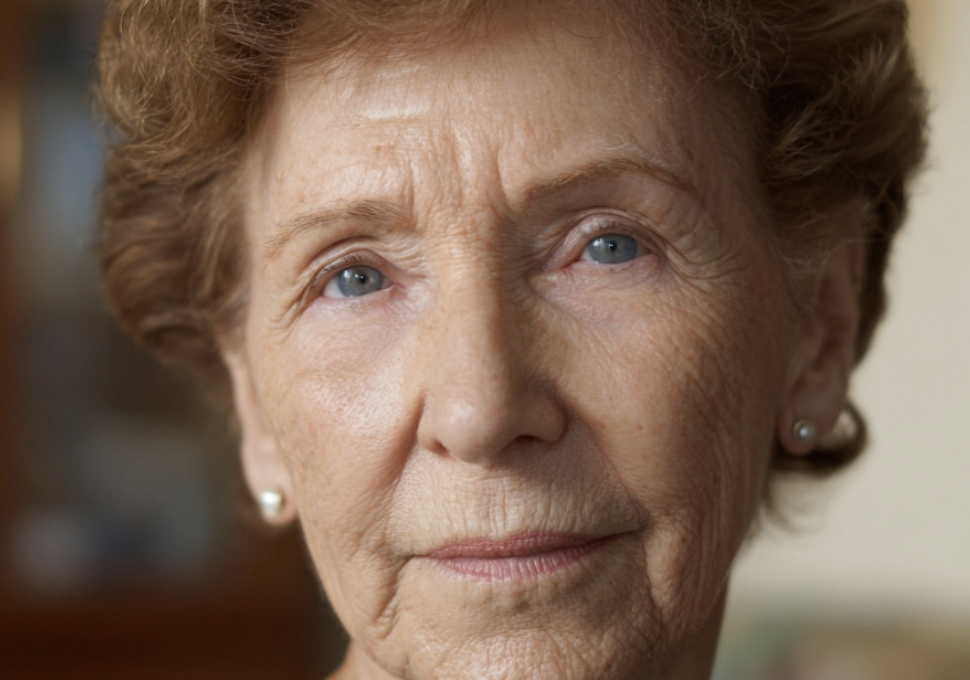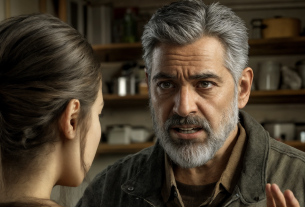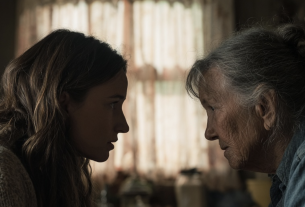“Mommy, we love you so much!” Alina leaned across the table and squeezed my hand. Her palm was cool, and her perfectly manicured nails dug into my skin a little harder than daughterly tenderness required.
“We love you very much,” echoed Stas, her brother, lazily poking at his salad with a fork. “We worry about you.”
I forced a smile. They worry, do they. In recent months their “worry” had grown almost tangible; it filled my apartment like choking gas.
“I’m fine, kids. Better than you think.”
Alina perked up at once, her eyes running quickly over me, assessing.
“That’s good, Mom. Really good. It’s just… Olya and I”—Stas nodded toward his silent wife—“were thinking it might be hard for you to be out at the dacha alone this summer. Maybe we could… put things in order? Paint the fence, mow the lawn…”
“I hired someone,” I replied evenly. “He’ll take care of everything.”
Stas’s face went stony for a moment. Only a second, but I caught it.
“Hired someone?” Alina repeated, poorly hiding her surprise. “Why waste money, Mom? We’d do it ourselves, gladly. For you!”
Their synchronized concern looked rehearsed. Too smooth. Too fake.
I looked at their faces—so familiar and at the same time foreign—and tried to understand at what point they had turned into predators, patiently waiting for their moment.
In the end, the children decided to spend the night.
At night I went to the kitchen for a glass of water. Their voices carried from the guest room where they’d chosen to stay. They weren’t shouting, no. They were arguing—low and furious, like people divvying up a kill.
“The dacha should go to me, period,” hissed Alina. “You know perfectly well I put more into that renovation.”
“What renovation? You re-papered the walls!” Stas’s voice was quieter, but meaner. “I built the sauna! I’ve got two kids—they need fresh air, not your designer whims. And anyway, I’m the eldest.”
“Oh, the eldest! When you dodged the draft, you didn’t remember being the eldest! Mom listens to me more as it is. I’ll prep her. A couple of weeks and she’ll sign whatever we need.”
“You?” he snorted. “She isn’t as big a fool as she seems. We need a different approach. Something more… solid.”
I stood in the dark hallway and the floor slipped from under my feet. There was no pain, no hurt. Only a cold, crystal-clear understanding. They weren’t just waiting. They were acting.
I went back to my room. I never did drink the water. My thirst was gone. In its place came something else. A cold, bell-clear resolve. The game had begun. And I would be the one to set the rules.
The next morning I woke with a clear head. The kids had already left. First thing, I called an old acquaintance—a property lawyer. We set up a meeting. Then I called Alina.
“Hello, honey. Could you drop by? I need help sorting through some old papers.”
Her voice immediately filled with sugary concern.
“Of course, Mommy! I’m on my way! Did something happen?”
“Nothing special,” I said. “It’s just time to put things in order.”
When Alina arrived, I “accidentally” left the lawyer’s business card on the coffee table. She noticed it instantly. Her gaze flicked from the card to my face, a mix of worry and suspicion swirling in her eyes.
“A lawyer? Mom, are you in trouble?”
“I’m handling some matters,” I said vaguely, handing her a stack of old documents. “Help me sort these.”
All evening she was on pins and needles. She tried to steer the conversation to the dacha, to future plans, but I answered in monosyllables, making her even more nervous. As she was leaving, she hugged me too tightly.
“Mom, if something’s wrong, just say so. We’re family.”
“Of course, dear. Family is what matters.”
The next day Stas showed up. Without calling. He walked into my apartment with the air of an owner come to inspect his property.
“Mother, what’s with the games?” he began without preamble. “Alinka said you’ve been seeing lawyers. Decided to rewrite the will?”
“Why are you so upset?” I looked him calmly in the eye. “Afraid you won’t get anything?”
He flushed crimson.
“Don’t talk nonsense! I’m worried about you! At your age you shouldn’t be making hasty decisions. Who knows what swindlers are circling.”
“Thanks for the concern, son. But my mind is still quite sound. And I know perfectly well who’s a swindler and who isn’t.”
Deliberately, I picked up the phone and dialed a number. Stas froze, watching me.
“Hello, is this the ‘Give Hope’ charity?” I said loudly and clearly. “Good afternoon.
“My name is Anna Viktorovna. I’d like to discuss the terms of a donation… Yes, a substantial one. It concerns a country house with a plot…”
I watched Stas’s face contort. He looked at me as if I’d just stabbed him.
In his eyes there wasn’t just anger. There was fear. An animal fear of losing what he already considered his.
“What are you doing…” he whispered when I finished the call.
“Putting my life in order,” I smiled at him with my sweetest smile. “And my property. Don’t worry, I’ll leave something for you and your sister too. The utility bills, for example. They happen to need paying.”
He shot out of the apartment, slamming the door so hard the walls shook. I knew that was only the beginning. Now they wouldn’t whisper at night. They would come together. And it wouldn’t be a game anymore. It would be war. And I was ready for it.
They came two days later. Together. Just as I’d thought. They came in without waiting to be invited, faces stern and determined. The masks were off.
“Mom, we demand an explanation,” Alina crossed her arms over her chest. There wasn’t a drop of daughterly love in her voice, only cold calculation.
“Demand?” I raised an eyebrow. “Interesting.”
“Stop this circus!” Stas barked. “What charity? Are you in your right mind? We won’t let you squander family property!”
I looked at them silently. At their faces twisted with malice. And for the first time in a long while, I felt nothing but a strange, cold calm.
“You still don’t get it, do you?” I asked quietly. “It’s not about the dacha.”
They exchanged glances.
“Then what is it about?” Alina asked with sarcasm.
“It’s about you. About your love. I just wanted to see where its boundaries lay. Turns out they run exactly along the cadastral number of the dacha plot.”
I paused, letting it sink in.
“That call to the charity was theater. For you. So you’d finally show your true faces. Thank you, you didn’t disappoint.”
“So you’re not giving the dacha away?” Stas exhaled in relief.
“No,” I shook my head. “I’m not giving it away. I sold it.”
A ringing emptiness fell over the room. They stared at me, complete, crushing incomprehension in their eyes.
“How… sold?” Alina whispered.
“Quite simply. I signed the contract the day before yesterday. The money is already in my account. By the way, the buyers are a very sweet young couple. They’ve long dreamed of a place like that.”
“You… you had no right!” Alina screeched, red blotches spreading across her face. “We would have invested in it! We would have…”
“You would have waited for my death,” I finished for her. “Arguing at night over who would get it. I heard you.”
That was the final blow. They froze. Stunned. Humiliated.
“I raised you. I gave you everything I could. And I have the right to live out the rest of my days as I see fit. Without you.”
I stood and walked to the door, opening it.
“Leave.”
They looked at me with hatred—the same naked hatred I’d seen in their eyes when they thought I wasn’t looking.
“You’ll regret this!” Stas threw over his shoulder.
“No, son,” I said, looking him straight in the eye. “I’ve already regretted everything. Long ago.”
The door closed behind them. I was alone in my apartment. There was no joy, no triumph. It was quiet.
And in that quiet I finally heard myself. I hadn’t become free. I had simply stopped being needed. And that turned out to be the most valuable acquisition of my life.
Six months passed. The first weeks after they left were strange. I mechanically waited for a call, a message, any sign of their habitual presence. But the phones stayed silent.
They struck me from their lives as decisively as I struck them from my will.
The money from the sale of the dacha sat in my account, and for a long time I didn’t know what to do with it. It felt like payment for renouncing my children, a bitter compensation. Then one morning I woke up and realized—it wasn’t payment. It was a ticket.
I bought a tour. Not to Turkey or Egypt, but to Kamchatka. The place my late husband had always dreamed of visiting, but we never managed to go.
I looked at volcanoes, at the Pacific Ocean, at bears catching fish. And for the first time in many years I felt not emptiness, but space. Space for myself.
When I got back, I enrolled in Italian classes. In my group there were students, young couples, and a few women like me who had decided to start something new.
We laughed as we mixed up words, went to little Italian restaurants, and talked about everything under the sun—except our children.
It turned out the world is full of people who find you interesting just because. Not because you’re a mother or the owner of a dacha. Simply because you are you.
Once, in the supermarket, I ran into Olya, Stas’s wife. She was pushing a cart with my younger grandson sitting in it.
He’d grown. Olya pretended not to see me and sharply turned down another aisle.
But I managed to notice her tired face, the dull eyes, the cheap puffer jacket. Clearly, things weren’t going well for them.
And a week later a distant relative called me.
“Hi, Anya. Have you heard? Alinka divorced her husband. They say he couldn’t take her constant complaints anymore.
“And Stas got himself into some debts, almost mortgaged the apartment. Now they’re looking for someone to lend them a hand.”
She fell silent, waiting. I knew what she was waiting for—that I would rush to the rescue, to help, because after all they’re my children.
“It’s a pity,” I replied evenly. “I hope they manage.”
I hung up. And I felt nothing. No schadenfreude, no pity. Their life had become, for me, just a news bulletin from a foreign country. They made their choice, and I made mine.
I didn’t become “happier” in the usual sense. Happiness is too grand a word. I became self-sufficient.
I learned to fall asleep without sleeping pills and wake without anxiety. I realized that being needed is not an obligation, but a luxury.
And you can afford it only with those who value you—not what you have.


